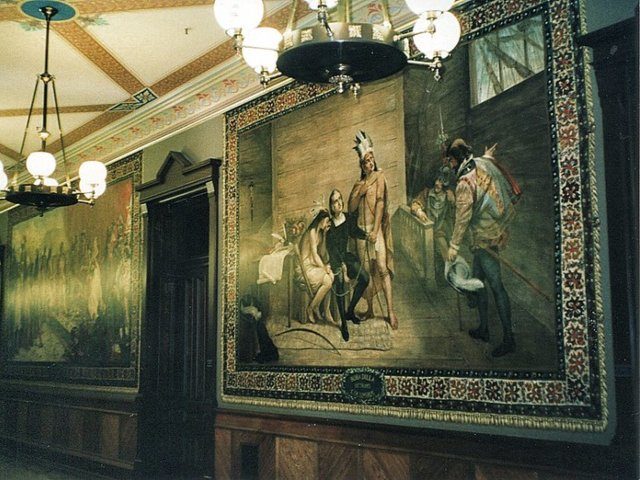The University of Notre Dame announced over the summer that it would cover 12 murals of Christopher Columbus with tapestries inspired by Native American artwork. Now former Stanford professor Carol Delaney, who wrote a book examining Christopher Columbus’ legacy, is speaking out. Delaney says she is “appalled” by Notre Dame’s censorship, claiming Columbus is “not the man” social justice activists claim.
According to a report by Campus Reform, a retired Stanford professor is pushing back this week against the University of Notre Dame’s effort to cover up murals of Christopher Columbus. The murals were covered up by tapestries in the style of Native American artwork as part of a larger effort by the university to reexamine popular narratives about Christopher Columbus.
Activists have pushed to replace Columbus day for some time. Breitbart News reported in September that officials in Baltimore pushed to replace a monument to Columbus with a “police violence victims” monument.
The Notre Dame murals were painted by Vatican painter Luigi Gregori in the university’s main building between 1882 and 1884. In August, they were completely covered by tapestries that hang over the historic murals.
Last week, Delaney, who authored a book titled, Columbus and the Quest for Jerusalem: How Religion Drove the Voyages that Led to America, told Campus Reform that the university’s decision to “I am appalled at what Notre Dame is doing,” Delaney said. “Instead they [Columbus’ detractors] need to learn more about Columbus.. he is not the man they think he is…and also why not have two murals!”
The university explains on its website that the decision to cover the mural prompted a conversation on campus about Columbus’ legacy.
In autumn of 2020, the Christopher Columbus murals of 1882-1884 by the Vatican-based painter Luigi Gregori in the University’s Main Building were covered with removable tapestries. This followed an intensive period of discussion, research and reflection across the Notre Dame and regional communities on how best to address a complex narrative that was considered celebratory in the late 19th century but that many found troubling by the early 21st century –- especially in its depiction of Native Americans.
Stay tuned to Breitbart News for more campus updates.

COMMENTS
Please let us know if you're having issues with commenting.